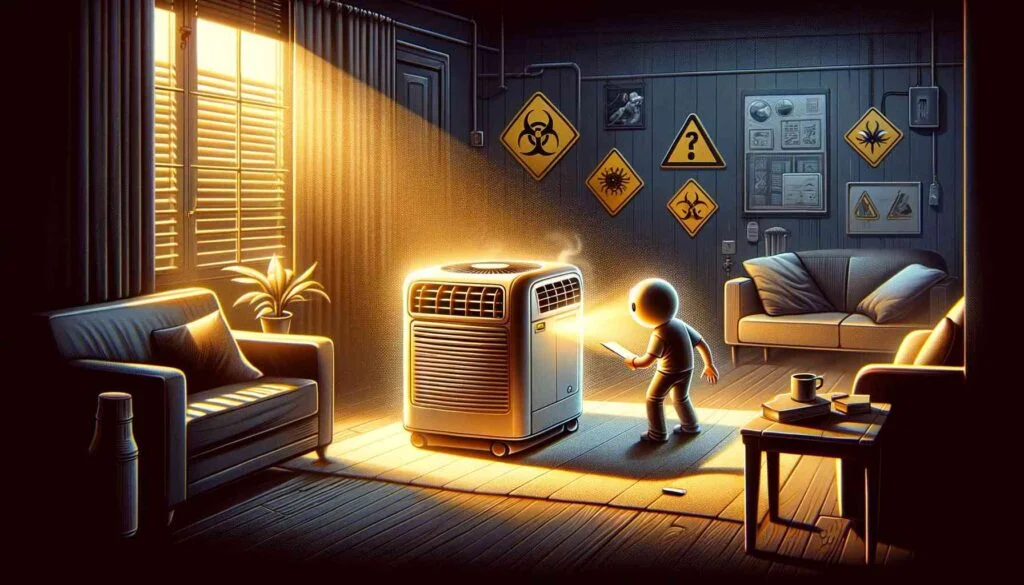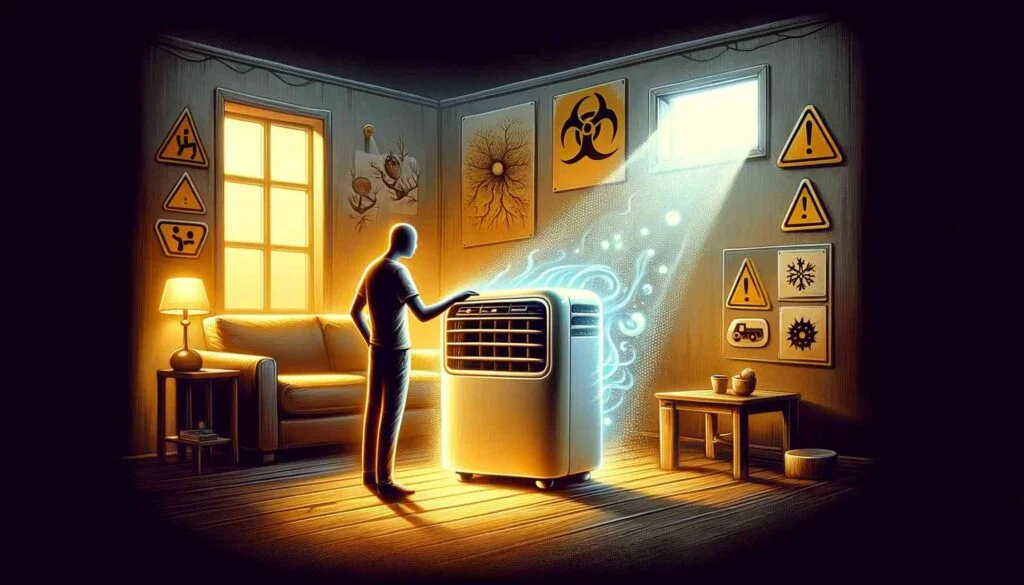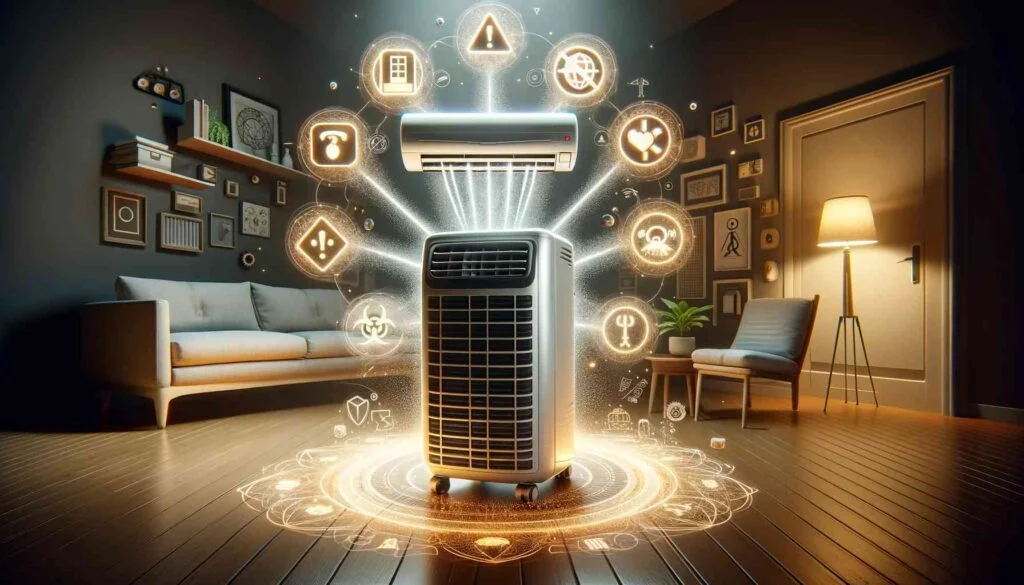No, a portable air conditioner cannot directly kill you. While it is an electrical appliance with inherent risks, proper use typically poses no lethal threat.
Portable air conditioners have become a popular solution for beating the heat in spaces where traditional air conditioning isn’t available or practical.
Compact and relatively easy to install, they offer the convenience of mobility and are a less permanent alternative to window units or central air systems.
Ensuring safety with these devices revolves around proper handling, regular maintenance, and situational awareness.
Users should always follow the manufacturer’s guidelines, including not overloading electrical circuits and keeping the unit away from water sources to minimize the risk of electrical hazards.
Venting a portable air conditioner correctly is also crucial, as it prevents any potential buildup of harmful refrigerants or exhaust. With these precautions in mind, a portable air conditioner remains a safe and effective option to maintain comfort during hot weather.
Understanding The Risks

Discussions surrounding the safety of portable air conditioners often conjure mixed perceptions. Can these convenient, movable cooling units pose serious threats to your well-being?
Below, we delve into the reality behind the risks associated with portable air conditioners, debunking myths and highlighting important safety considerations. Educating yourself on this topic is crucial for ensuring a safe and comfortable environment.
Common Misconceptions
Myths and misinformation often circulate regarding the potential dangers of portable air conditioners. Claims range from the seemingly outlandish, like the unit causing hypothermia, to concerns about toxic refrigerants leaking into your living space. It’s essential to separate fact from fiction:
- Myth: Portable air conditioners can cause severe health issues by drastically lowering room temperatures.
- Truth: While extreme cold can be harmful, portable AC units are designed to maintain comfortable temperatures, not reach chilling extremes.
- Myth: Using a portable air conditioner leads to poor indoor air quality.
- Truth: Most units are equipped with filters to ensure air cleanliness, though regular maintenance is key to optimal performance.
Potential Hazards Of Portable Air Conditioners
Despite their general safety, certain conditions may transform portable air conditioners into hazards:
- Improper Installation: Failures to follow installation guidelines can lead to exhaust issues or unstable setups, potentially causing accidents or poor ventilation.
- Electrical Concerns: Overlooking the power requirements or using faulty wiring can result in fire risks or electrical shocks.
- Chemical Leaks: Though rare, improper handling or unit damage could lead to refrigerant leakage, which is dangerous if inhaled or touched.
Furthermore, users should be aware of the unit’s water condensation system. Neglecting to empty the water reservoir could create conditions favorable for mold and bacteria growth, posing health risks.
Safeguarding against these risks involves adhering to manufacturers’ guidelines, regular inspections, and understanding the unit’s limitations.
While portable air conditioners are not inherently dangerous, negligence in their use could escalate into serious safety hazards. Practicing due diligence is paramount to enjoying the cool benefits of these devices without compromising health and safety.
Factors Affecting Safety

An often-asked question rings in the minds of many looking to cool their spaces: Can a portable air conditioner kill you? While fears may arise from sensational headlines, it’s essential to consider the practical aspects that magnify the safety of using these devices.
Understanding the variables that impact safety is crucial to mitigate any potential hazards. Let’s delve into these factors to ensure peace of mind while enjoying a cooler environment.
Proper Installation
Ensuring correct setup of your portable air conditioner is paramount for safe operation. An incorrectly installed unit may lead to multiple issues, including poor performance and heightened safety risks. To guarantee the integrity of your device:
- Follow the manufacturer’s installation guide meticulously.
- Place the unit on a stable, flat surface to prevent tipping.
- Ensure the exhaust hose is securely connected and the path to outside is unobstructed.
Ventilation And Airflow
Maintaining quality ventilation remains a cornerstone for the safe use of any portable air conditioner. Without proper airflow, these units might become less effective, and the risk of creating a vacuum effect in a room can lead to complications with oxygen levels. To promote optimal airflow:
- Keep doors or windows slightly ajar to enhance circulation.
- Regularly clean filters to avoid blockages that hamper air movement.
- Space out furniture to avoid airflow restrictions around the unit.
Electrical Safety
Adhering to electrical safety standards is essential when operating any electrical appliance, and portable AC units are no exception. Electrical hazards can pose severe risks such as fires or electrocution. To promote electrical safety:
- Inspect your unit’s plug and cord for signs of damage or wear.
- Plug the unit directly into a wall outlet rather than using extension cords.
- Ensure your home’s wiring is adequate to handle the unit’s power needs.
Regular checks and maintenance can preempt many electrical issues, contributing to both the efficiency and safety of your portable air conditioner.
Health Concerns

The question of whether a portable air conditioner can pose a lethal risk has garnered attention, especially considering the essential nature of such devices in our daily comfort.
Let’s analyze the potential health concerns associated with portable air conditioners, highlighting the factors that influence indoor air quality, humidity levels, and respiratory health. Awareness and proper management can prevent adverse health effects and ensure a safe environment.
Indoor Air Quality
Good indoor air quality is paramount for maintaining overall health. Portable air conditioners have filters that capture dust, allergens, and other particulates from the air, which are important factors in ensuring that the air we breathe is clean.
However, if these filters are not regularly cleaned or replaced, they can become clogged and not only reduce efficiency but also lead to the circulation of poor-quality air.
It’s crucial to follow the manufacturer’s recommendations for filter maintenance to avoid these issues.
Managing Humidity Levels
High humidity levels can create an uncomfortable and potentially harmful living environment, fostering the growth of mold and mildew.
Adequate management of humidity levels is essential. Portable air conditioners dehumidify the air as they cool, which can help in reducing moisture and preventing the growth of mold.
Nevertheless, if the unit is not functioning correctly or if the space is too large for the unit’s capacity, it may not effectively manage humidity, leading to health concerns related to mold exposure such as respiratory issues and allergic reactions.
Impact On Respiratory Health
The impact on respiratory health is a critical aspect when considering any air conditioning unit. Portable air conditioners that are poorly maintained can harbor and circulate contaminants like bacteria and mold spores which can lead to respiratory problems, especially in individuals with pre-existing conditions like asthma or allergies.
Ensuring that the portable air conditioner is well-maintained and the space is adequately ventilated can mitigate these concerns and promote a healthier breathing environment.
Safe Usage Practices

When it comes to cooling down a room efficiently, portable air conditioners are a popular choice. However, like any electrical appliance, they come with their own set of safety guidelines that are paramount to follow.
Ensuring your portable air conditioner doesn’t pose a health risk involves observing safe usage practices. These practices not only prolong the life of your device but also safeguard your well-being. Let’s delve into some essential safety tips.
Regular Maintenance
Proper maintenance is key to the safe operation of any portable air conditioner. Without regular checks and cleaning, various issues can arise that may impact air quality or even pose fire hazards. Here are some maintenance actions you should take:
- Check and clean filters bi-weekly to prevent dust and allergen buildup.
- Ensure the exhaust hose is free of any obstructions or kinks.
- Examine the cord and plug for any signs of damage or wear.
- Drain any accumulated condensate water to prevent mold growth.
Temperature Regulation
Accurately regulating the temperature is crucial for both comfort and safety. Extreme temperatures, especially high heat, can lead to health issues such as heat stroke or dehydration. Follow these guidelines to manage temperature effectively:
- Set your portable AC to a comfortable temperature that avoids overcooling.
- Use a programmable thermostat to maintain a steady temperature.
- Keep the room closed off to ensure even and efficient cooling.
- Allow the device to take breaks by turning it off at certain times, if possible.
Monitoring Carbon Monoxide Levels
While portable air conditioners are not known for emitting carbon monoxide (CO), it’s imperative to remain vigilant about CO levels whenever you’re using a gas-powered generator to run your AC during a power outage. Carbon monoxide poisoning can be fatal, so keep these precautions in mind:
- Install a carbon monoxide detector near your sleeping and living areas.
- Never use a generator indoors, in a garage, or near windows/doors.
- Have any fuel-burning appliances checked annually by professionals.
Ensuring Peace Of Mind
Concerns about the safety of portable air conditioners can weigh heavily on the minds of consumers, particularly when considering the purchase of such a pivotal appliance for the comfort of your home.
The thought of a portable air conditioner posing a lethal threat seems far-fetched, yet it is a topic that garners attention and stirs curiosity.
Ensuring peace of mind is critical; understanding the facts, debunking the myths, and adhering to expert advice can help mitigate any undue worries and keep you both cool and safe.
Expert Recommendations
To foster a secure environment, professionals in the field of home appliances and HVAC systems stress the importance of certain practices. Here are expert tips for safe portable air conditioner usage:
- Regular maintenance – Keep your unit clean and check for any signs of damage or malfunction.
- Proper installation – Ensure that the air conditioner is installed according to the manufacturer’s instructions, including ventilation and exhaust.
- Electrical safety – Use a grounded outlet and avoid overloading circuits to prevent electrical fires.
Common Myths Debunked
The myths surrounding the dangers of portable air conditioners often contribute to undue fear. Let’s clear the air:
| Myth | Fact |
|---|---|
| They emit toxic gases | When used and maintained properly, portable AC units do not release harmful gases. |
| They are a common cause of fire | Fire risks are extremely low, especially with adherence to safety guidelines and proper use. |
Final Thoughts
Peace of mind with portable air conditioners is achievable through informed choices, sensible use, and attention to safety precautions. Embrace the comfort that these appliances offer, while also respecting the guidance provided by experts to ensure a safe, cool, and enjoyable living space.
Frequently Asked Questions For Can A Portable Air Conditioner Kill You?
Is Portable Air Conditioning Safe?
Portable air conditioners are generally safe when used properly and maintained according to the manufacturer’s guidelines. Ensure the unit is stable and the electrical setup is correct to prevent accidents.
Can Air Conditioners Emit Harmful Gases?
A malfunctioning portable air conditioner can potentially leak refrigerants like Freon, which in large quantities could pose health risks. Regular maintenance can prevent these issues.
What Are Common Portable Ac Hazards?
Common hazards include electrical risks, fire due to faulty wiring or overheating, and tripping from cords. Proper installation and routine checks can minimize these dangers.
Conclusion
To wrap things up, the dangers posed by portable air conditioners are minimal when used correctly. Regular maintenance and proper operation are key to ensuring your safety. Don’t let fear dissuade you; with vigilant use, portable ACs can offer you comfort without risk.
Stay cool and secure!
